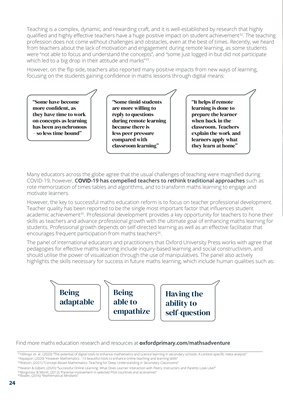
Being
adaptable
Being
able to
empathize
Having the
ability to
self-question
"Some have become
more confident, as
they have time to work
on concepts as learning
has been asynchronous
- so less time bound"
"Some timid students
are more willing to
reply to questions
during remote learning
because there is
less peer pressure
compared with
classroom learning"
"It helps if remote
learning is done to
prepare the learner
when back in the
classroom. Teachers
explain the work and
learners apply what
they learn at home"
Teaching is a complex, dynamic, and rewarding craft, and it is well-established by research that highly
qualified and highly effective teachers have a huge positive impact on student achievement32. The teaching
profession does not come without challenges and obstacles, even at the best of times. Recently, we heard
from teachers about the lack of motivation and engagement during remote learning, as some students
were "not able to focus and understand the concepts", and "some just logged in but did not participate
which led to a big drop in their attitude and marks"33.
However, on the flip side, teachers also reported many positive impacts from new ways of learning,
focusing on the students gaining confidence in maths lessons through digital means:
Many educators across the globe agree that the usual challenges of teaching were magnified during
COVID-19, however, COVID-19 has compelled teachers to rethink traditional approaches such as
rote memorization of times tables and algorithms, and to transform maths learning to engage and
motivate learners.
However, the key to successful maths education reform is to focus on teacher professional development.
Teacher quality has been reported to be the single most important factor that influences student
academic achievement35. Professional development provides a key opportunity for teachers to hone their
skills as teachers and advance professional growth with the ultimate goal of enhancing maths learning for
students. Professional growth depends on self-directed learning as well as an effective facilitator that
encourages frequent participation from maths teachers36.
The panel of international educators and practitioners that Oxford University Press works with agree that
pedagogies for effective maths learning include inquiry-based learning and social constructivism, and
should utilise the power of visualization through the use of manipulatives. The panel also actively
highlights the skills necessary for success in future maths learning, which include human qualities such as:
Find more maths education research and resources at oxfordprimary.com/mathsadventure
24 31Hillmayr et. al., (2020) "The potential of digital tools to enhance mathematics and science learning in secondary schools: A context-specific meta-analysis"
32Kayaspor, (2020) "However Mathematics - 13 beautiful tools to enhance online teaching and learning skills"
33Watson, (2021) "Concept-Based Mathematics: Teaching for Deep Understanding in Secondary Classrooms"
34Keaton & Gilbert, (2020) "Successful Online Learning: What Does Learner Interaction with Peers, Instructors and Parents Look Like?"
35Borgonovi & Montt, (2012) "Parental involvement in selected PISA countries and economies"
36Boaler, (2016) "Mathematical Mindsets"